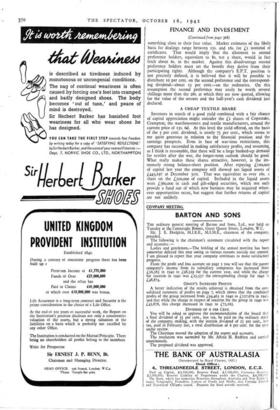FINANCE AND INVESTMENT
By CUSTOS
AFTER the recent rise it is not surprising that the stock markets should show signs of tiredness. In some groups yields have now been levered up into reasonably closer ielationship with gilt-edged ; but, taking markets as a whole, I am prepared to see a further upward adjustment of prices in the industrial and speculative sections. I take this view not because of any fear of inflation, but simply on the theory that equity share yields are too high. From time to time there will be consolidation periods during which investors will have a breather, but the rise will probably be fairly rapid unless the war news should turn grim.
ODEON FINANCES
Mr. J. Arthur Rank has done well to explain to shareholders in Odeon Theatres what has been achieved by the recent financial operations. Loose mortgages have been effectively tied up by the formation of the new Odeon Theatres Properties subsidiary, and other short-term indebtedness within the group has been put on a more solid basis. So, a step at a time, the cinema industry is moving into a more rational set-up. Investors will hope that the same will towards consolidation will prove effective after the war, when the temptation to cut prices and compete in building returns.
CELANESE SCHEME REACTIONS Now that the eagerly-awaited scheme to deal with British Celanese second preference arrears has appeared, opposition hJ, developed. While nobody objects to the funding certificate method of satisfying arrears, these particular certificates do not seem to gl'e the second preference shareholders full value for money. Carrying interest at 4 per cent., they lack the sort of sinking fund or otli.t redemption arrangements which would entitle them to sell f.'t (Continued on page 370)
FINANCE AND INVESTMENT
(Continued from page 368) something close to their face value. Market estimates of the likely basis for dealings range between 155. and 16s. for Li nominal of certificates. That would imply that the allotment to second preference holders, equivalent to 8s. net a share, would in fact fetch about 6s. in the market. Against this disadvantage second preference holders must set the benefit they derive from their participating rights. Although the company's E.P.T. position is not precisely defined, it is believed that it will be possible to distribute to per cent. on the second preference and the correspond- ing dividend—about 15 per cent —on the ordinaries. On this assumption the second preference may easily be worth several shillings more than the 26s. at which they are now quoted, allowing for the value of the arrears and the half-year's cash dividend just declared.
A CHEAP TEXTILE SHARE
Investors in search of a good yield combined with a fair chance of capital appreciation might consider the Li shares of Copestake, Crampton, the warehousemen and textile manufacturers, around the current price of 135. 6d. At this level the yield offered, on the basis of the 5 per cent, dividend, is nearly 7f per cent., which seems to me quite generous in relation to the financial position and the earnings prospects. Even in face of war-time restrictions, this company has succeeded in making satisfactory profits, and assuming, as I think is reasonable, that there will be a large banked-up demand for textiles after the war, the longer-term outlook should be good. What really makes these shares attractive, however, is the im- mensely strong balance-sheet position. After repaying £too,000 of capital last year the company still showed net liquid assets of £443,197 at December 31st. That was equivalent to over 16s. a share on the £500,000 of capital. Included in the liquid assets were £36o,000 in cash and gilt-edged securities, which not only provide a fund out of which new business may be acquired when- ever opportunities occur, but suggest that further returns of capital are not unlikely.



























 Previous page
Previous page